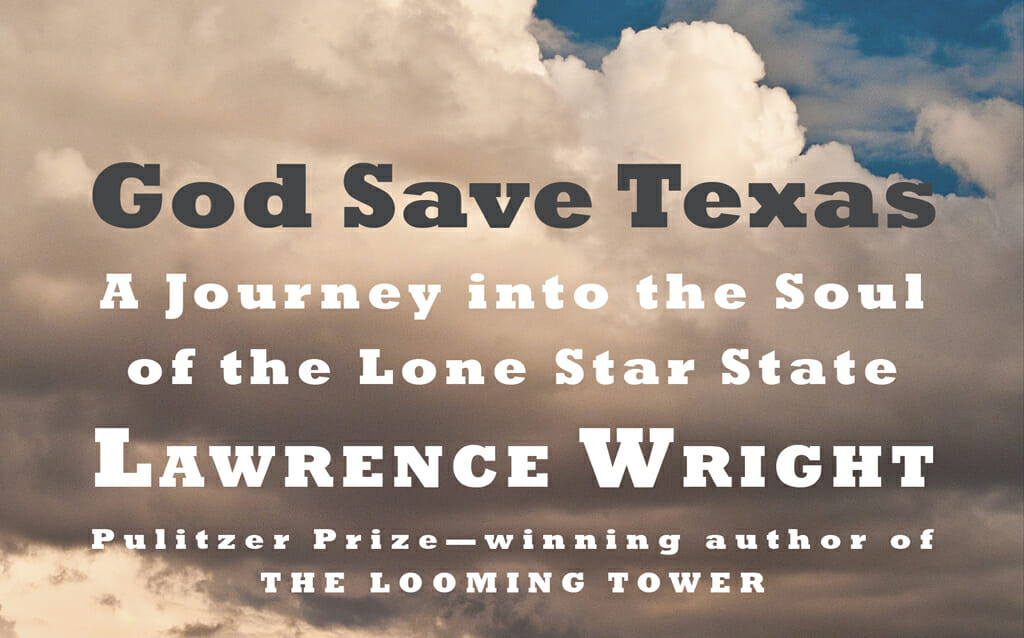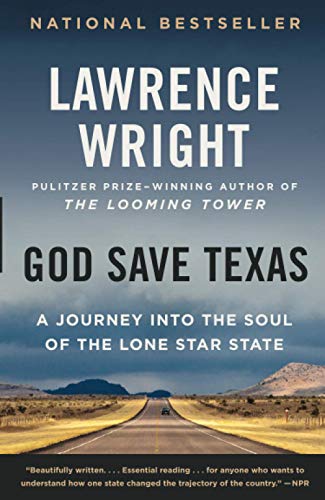Sleeping Giant Stirs in the Lone Star State
Lawrence Wright's new book, "God Save Texas," captures the frustration and hope that reverberate when divisive, retrograde politicians meet renewed grass-roots activism. Knopf
Knopf
“God Save Texas: A Journey into the Soul of the Lone Star State”
A book by Lawrence Wright
No matter how confounding the politics or embarrassing the legislature, Texas will always be home. That recognition—familiar to Texans the world over—runs through Lawrence Wright’s homage to the state. Wright, a Pulitzer Prize winner, screenwriter, playwright and staff writer for The New Yorker, has long been one of the Lone Star State’s most compelling storytellers. “God Save Texas” picks up where Wright’s past chronicling of all things Texas leaves off, pulling back the curtain on the inexplicable contradictions of my birthplace. But for anyone hoping that Wright will solve the mystery of how such a populist, neighborly state became the test bed for the most racist, homophobic and anti-women’s-rights laws and policies in the country, we will have to wait for Volume 2. “God Save Texas” is more of a plea than a prophecy.
Wright’s book is particularly timely given Texas’ status as the canary in the coal mine for what America would look like with divisive, retrograde politicians at the helm. As Evan Smith, co-founder of The Texas Tribune, sagely notes in the book: “White people are scared of change, believing that what they have is being taken away from them. … In 2004 the Anglo population in Texas became a minority.” It’s no coincidence that the social conservatives who have ruled the state for two decades have continued to look backward “to a time when homosexuals were unseen, minorities were powerless, [and] abortion was taboo.” Economically and demographically, there is little doubt that, as Wright has written, “America’s future is Texas.” Whether that declaration is hopeful or ominous depends on whether Texas itself will embrace the future, including a growing, young, multicultural population that would be the envy of so many other states.
Click here to read long excerpts from “God Save Texas” at Google Books.
“God Save Texas” starts at the very beginning, with the founding of Texas. Wright illustrates how, even then, this land of plenty—plenty of land, plenty of oil, plenty of natural resources—was a land of wealth for some and deprivation for many. In recent years, Texas has been a cautionary tale of the disastrous consequences of single-party rule. There hasn’t been a Democrat elected statewide in 20 years, which has allowed the legislature and governor to draw congressional and state maps that have ensured lopsided representation. Austin, reliably the most progressive city in the state, has been carved into six congressional districts—a feat that redefines gerrymandering. The legislative districts are equally unrepresentative, and only House Speaker Joe Straus, a moderate Republican from San Antonio, has occasionally kept the Capitol from completely going off the rails. His decision to retire this year portends even worse political days ahead. Wright describes meeting with Straus, who laments the obsession of the legislature with passing “bathroom bills,” chipping away at the right to abortion and doing little else. “And just think,” Straus opines about his colleagues, “these are the people responsible for spending $218 billion.”
Building the Texas of the future requires investments the legislature has so far refused to address, including in public education and health care. Because the state doesn’t spend enough money on education, Texas ranks near the bottom in educational achievement. One in four children lives in poverty. In addition, the state has repeatedly refused to expand Medicaid, and after it shut down the Women’s Health Program in an attempt to end access to health care at Planned Parenthood, maternal mortality rates have increased, as have incidences of breast and cervical cancer diagnosed too late. Recently, as Wright recounts, progressive state Rep. Jessica Farrar became so disgusted she introduced the Man’s Right to Know Act, which would require a sonogram and rectal exam before a man could get a Viagra prescription. It didn’t get too far, but it made plenty of news.
“God Save Texas” also shines a light on the rise to power of some of the most dangerous political figures in the country—from talk radio host Alex Jones to the state’s singularly worst elected official, Lt. Gov. Dan Patrick, who served as Donald Trump’s campaign manager for Texas. You have to read the book to fully appreciate just how extreme Patrick is, but consider his obsession with his hallmark priority: allowing licensed gun owners to openly carry them anywhere and everywhere, including groceries and retail stores. Gun enthusiasts fully exploited this newly won right by carrying long guns into Target, frightening families shopping with their kids. Some of us can still recall a time when Patrick would have been seen as too extreme for the reliably Republican Texas business community. A recent full-page ad featuring prominent captains of industry endorsing his re-election is evidence to the contrary: For anyone who thought business would step in to keep the Republican Party from running the state off the cliff, those days are past.
But, as Wright points out, there are signs of life across the state. Today, Texas is witnessing renewed grass-roots activism and the election of progressive leaders. The new mayor of Houston, former state representative Sylvester Turner, is one example. Only the second African-American ever to lead the state’s most populous city, Turner explains that “Houston is now the single most ethnically diverse city in the country.” The city is also young, with 40 percent of the population under the age of 24, and nearly 70 percent of them are young people of color. As Houston pollster Richard Murray has pointed out, “Texas isn’t a red state or a blue state—it’s a non-voting state.” He’s right: During the last presidential election, turnout was an anemic 43 percent among Texas registered voters, compared with the national average of 60 percent. And yet, the gap between Hillary Clinton and Trump was a mere nine percentage points in Texas. Additionally, the current U.S. Senate race between Republican Sen. Ted Cruz and Democratic Rep. Beto O’Rourke has suddenly become competitive. There is a sleeping giant in Texas, and Wright captures the frustration and the hope that reverberate across the state each time it stirs.
Increasingly, the politics of the legislature and the politics of the populace are diverging. Every recent far-right initiative has resulted in an unprecedented outpouring of activism, starting with the abortion restrictions proposed in 2013. For days on end, the Capitol was full to capacity with citizens waiting to testify against them, culminating with a 13-hour filibuster by state Sen. Wendy Davis. Although then-Gov. Rick Perry suspended all rules in order to jam the bills through, the result was that thousands of young people got their first taste of political activism. Then-Lt. Gov. David Dewhurst called them “the unruly mob,” perhaps because it had been so long since he’d seen democracy in action.
The attacks on women’s health helped develop a new generation of activists; the women’s march in Austin in January 2018 was even larger than the one the year before, which was the largest since the inauguration of my mother, Ann Richards, as governor back in 1990. And this past legislative session, as the legislature prioritized a bathroom bill to discriminate against transgender people, additional abortion restrictions and a prohibition against sanctuary city protections for immigrant communities, their actions ignited unprecedented mobilization of Texans.
The essays in “God Save Texas,” written with Wright’s trademark wit and wry humor, celebrate what makes Texas unique and wonderful: free-flowing rivers, the canyons of Big Bend National Park, Lubbock musicians (plus Abbott-born Willie Nelson)—though he somehow omits the enchilada special at Matt’s El Rancho in Austin. At the same time, Wright doesn’t shy away from the fact that, for many Texans, it is hard to square up the state we grew up in with the intolerance that has become our national reputation.
Wright’s ambivalence about his state is threaded throughout the book. His concern about the lack of compassion manifested by the disregard for schools and prisons and mental health and the environment weighs heavy. As he says, “Part of me had always wanted to leave Texas, but I had never actually gone.” For those of us who care about our home state, and those who want to understand it, we are fortunate he stayed. Despite it all, I’m hopeful for the future of the state we love, and the humility and irreverence that keep us sane in the meantime—the same humility and irreverence on display in the Austin restaurant that posted a sign on its restrooms during the bathroom bill fight: “Whatever, just wash your hands.” (And for all the dispiriting news, the legislature did address some important matters this year. Even with the rancor and partisan division, it passed a bill allowing the hunting of wild pigs from hot air balloons. I’m only sorry Molly Ivins wasn’t still around to cover it.) In the end, perhaps the most important message of the book is the one Wright doesn’t say: Let’s not count on God to save Texas. Instead, let’s do it ourselves.
Cecile Richards, born and raised in Texas, has been a lifelong activist for women’s rights and social justice, including more than a decade as president of Planned Parenthood Federation of America and Planned Parenthood Action Fund. She is the author of “Make Trouble: Standing Up, Speaking Out, and Finding the Courage to Lead – My Life Story.”
©2018 Washington Post Book World
Your support matters…Independent journalism is under threat and overshadowed by heavily funded mainstream media.
You can help level the playing field. Become a member.
Your tax-deductible contribution keeps us digging beneath the headlines to give you thought-provoking, investigative reporting and analysis that unearths what's really happening- without compromise.
Give today to support our courageous, independent journalists.









You need to be a supporter to comment.
There are currently no responses to this article.
Be the first to respond.